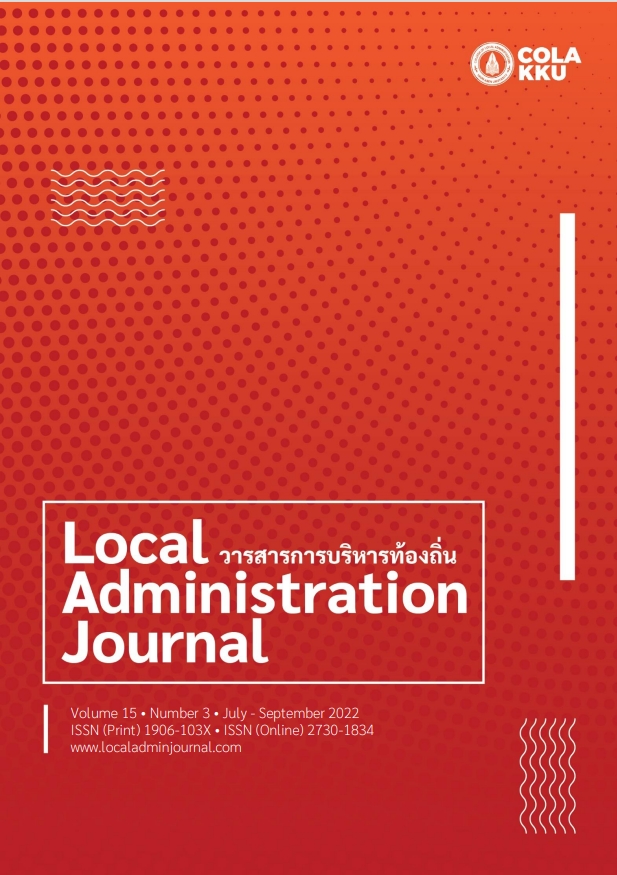Designing collaborative capacity enhancement: A case of collaboration in waste management in normal times and during the COVID-19 pandemic
Keywords:
COVID-19, waste management, health-care waste, collaboration, collaborative capacityAbstract
An increasing amount of waste is a universal issue that matters to many countries in the world including Thailand. Recently, the amount of global waste has tremendously increased due to the Covid-19 pandemic. A key solution to this problem is collaboration in waste management. This study conducted focus group discussions to elicit suggestions for enhancing collaborative capacities for waste management, both in normal times and during the COVID-19 epidemic in Thailand. The study produced the following recommendations: (1) Enhance knowledge, boundary-spanning, policy, and incentive capacity; (2) Determine how best to use existing resources to facilitate collaboration; (3) Define Key Performance Indicators (KPIs) of waste management collaboration; and (4) Create a reporting system and convene a multi-sector forum for monitoring and evaluation of the collaboration.
References
American Society for Quality (ASQ). (n.d.). What are the five S’s (5S) of lean? Retrieved from https://asq.org/quality-resources/lean/five-s-tutorial
Beechler, S., Sondergaard, M., Miller, E., & Bird, A. (2004) Boundary spanning. In H. Lane, M. Maznevski, M. Mendenhall, & J. McNett (Eds.), The Handbook of Global Management: A Guide to Managing Complexity (pp. 121-133). Malden, MA: Blackwell Publishing.
Bengtsson, M. (2016). How to plan and perform a qualitative study using content analysis. Nursing Plus Open, 2, 8-14.
doi.org/10.1016/j.npls.2016.01.001
Chotivanich, P., Phorncharoen, I. & Tankaeo, A. (2021). Waste Management Behaviors and Waste Management Approaches with Community Participation in Ubon Ratchathani City Municipality, Ubon Ratchathani Province. UBRU International Journal Ubon Ratchathani Rajabhat University, 1(2), 37-48.
Chotthong, B. & Boonyouang, S. (2021). Energy waste, what is a Solution? Thailand Environment Institute Foundation (TEI). Retrieved from https://www.tei.or.th/en /blog_detail.php?blog_id=77
Das, A. K., Islam, N., Billah, M. & Sarker, A. (2021). COVID-19 Epidemic and Healthcare Solid Waste Management Strategy – A mini-review. Science of The Total Environment, 778(146220), 1-8. doi.org/10.1016/j.scitotenv. 2021.146220
Grotenbreg, S. & Buuren, A. V. (2016). Realizing Innovative Public Waterworks: Aligning Administrative Capacities in Collaborative Innovation Processes. Journal of Cleaner Production, 171(2018), S45-S55. doi: 10.1016/j./jclepro.2016.08.128.
Institute for Global Environmental Strategies (IGES). (2020). Waste Management During the Covid-19 epidemic: From Response to Recovery. United Nations Environment Programme (UNEP). Retrieved from https://wedocs.unep.org/bitstream/handle/ 20.500.11822/33416/WMC19.pdf ?
Lichterman, P. (2009). Social Capacity and the Styles of Group Life. American Behavioral Scientist, 52(6), 846-866.
Lodge, D. & Wegerich, K. (2014). Administrative capacity. In Hertie School of Governance (Ed.), The Governance Report 2014 (pp. 151-170). Oxford: Oxford University Press.
National News Bureau of Thailand (NNT). (2019). Ubon Ratchathani Province promotes the “waste separation” campaign driving waste management towards a clean province. Retrieved from http://thainews.prd.go.th/th/news/print_news/TCATG190103185705792 (in Thai)
Pollution Control Department (PCD). (n.d.). Municipal solid waste management policy in Thailand. United Nations Economic and Social Commission for Asia and the Pacific (ESCAP). Retrieved from https://www.unescap.org/sites/default /files/ PCD_ MSWM%20policy.pdf
Protected Area Regional Office 9 (Ubon Ratchathani). (2018). “Ubon Clean City, Capital of Isan, big cleaning day, Pracharath (civil state) policy, Ubon Ratchathani Province” scheme. Retrieved from https://www.dnp9.com/dnp9/web1/web/edoc/Q8a32bFf4SMB.pdf
(in Thai)
Provincial Office of Natural Resources and Environment Ubon Ratchathani. (2017). Ubon Ratchathani provincial governor led civil servants in promoting the plastic bag and foam box are not welcome in the office scheme. Retrieved from http://ubonratchathani.mnre.go.th/th/news/detail/5654 (in Thai)
Regional Environmental Office 12, Ubon Ratchatani. (2017). Ubon Ratchani History. Retrieved from http://www.mnre.go.th/ reo12/th/about (in Thai)
Regional Environmental Office 12, Ubon Ratchatani. (2018). Results of the management of accumulated solid waste under the road map of 2018. Retrieved from http://www.mnre.go.th/ckeditor/upload/files/id164/pdf/Roadmap2561.pdf (in Thai)
Sathabhornwong, S. (2019). The Relationship between Thai Local Administrative Organisations’ Collaborative Capacities and Outcomes: The Case of Waste Management (Doctoral dissertation, University of Birmingham, Birmingham, United Kingdom). Retrieved from https://etheses.bham.ac.uk/id/eprint/9440/
Sathabhornwong, S. (2020). Collaborative Capacities for Successful Collaboration: The Case of Thai Local Administrative Organization’s Waste management. Local Administration Journal, 13(2), 103–136.
Thai PBS. (n.d.). Q: What is hospitel? Retrieved from https://Covid19.thaipbs.or.th/faq/ ?post= 25645 (in Thai)
Thammasat University. (2021). Infectious waste: Challenges in COVID-19 epidemic. Retrieved from https://tu.ac.th/en/thammasat-080964-infectious-waste-challenges-in-Covid19? fbclid=IwAR30OVCqzPmeV3JF505F8dtVvzYbVwoqrRh44eq1AzJMf_CJsNW7L-a4VE
Thomson, A. M. & Perry, J. L. (2006). Collaboration Processes: Inside the Black Box. Public Administration Review, December 2006 (Special Issue), 20-32.
World Health Organization (WHO). (2018). Healthcare Waste. Retrieved from https://www.who.int/news-room/fact-sheets/detail/healthcare-waste
Downloads
Published
How to Cite
Issue
Section
License
Copyright (c) 2022 Local Administration Journal

This work is licensed under a Creative Commons Attribution-NonCommercial-NoDerivatives 4.0 International License.
The copyright of all articles published in the Local Administration Journalis owned by the College of Local Administration, Khon Kaen University.



